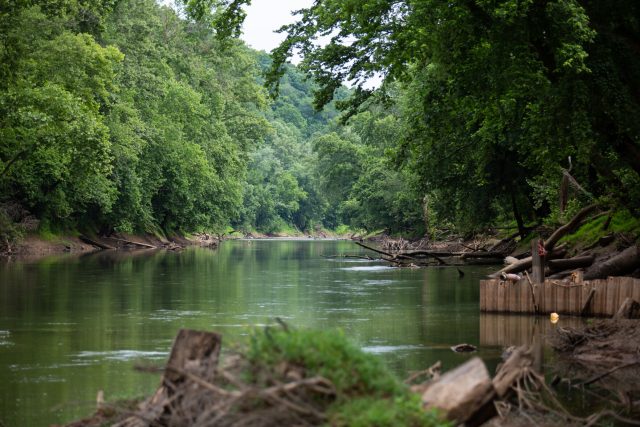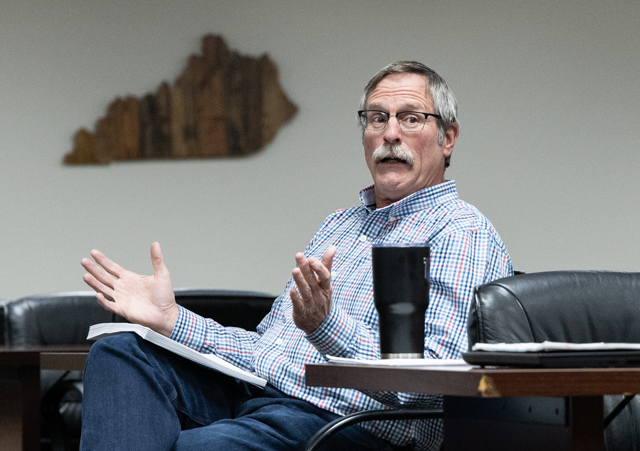Mammoth Cave opposing Barren solar project
Published 6:00 am Tuesday, April 29, 2025

- Water flows along Green River at Mammoth Cave National Park in 2021. (GRACE MCOWELL / Daily News)
As a controversial solar energy project moves ahead in Barren County, Mammoth Cave National Park has expressed concern over what it has described as a lack of communication from the company behind the project.
The solar project is known as Wood Duck Solar by Geenex, a Charlotte, North Carolina-based solar energy company. The project aims to construct solar panels across more than 2,300 acres in Barren County. According to Wood Duck’s website, the project will generate 100 megawatts of electricity once completed, enough to power 15,000 homes.
Residents of Barren County have expressed concerns over the potential impact the panels would have on farmland and possible reductions in property values and an increase in safety risks.
Trending
However, since there are essentially no applicable zoning regulations in Barren County, local government cannot stop the project.
“Barren County does not have land use restrictions, or in other words, zoning,” Planning and Zoning head Kevin Myatt told the Daily News in March. “There is no dictation of property on the use. The only thing we can regulate are setbacks and subdivision regulations, by law.”
The Daily News obtained a copy of a letter dated April 15 and sent from park Superintendent Barclay Trimble to the Kentucky Public Service Commission which outlines some of the park’s concerns.
“The (National Park Service) has unsuccessfully sought clarity to specific questions (1) would electricity be stored on-site in batteries? (2) what type of batteries would be used? (3) what steps or measures would be installed to prevent leaking or spilling of chemicals from these batteries, or other specific infrastructure … .
“Since these questions remain unanswered after multiple attempts to have dialogue with (Geenex) LLC over the past several months, the NPS is choosing to speak out in opposition of this project … ,” the letter states.
Mammoth Cave representatives told the Daily News via email that since the panels are proposed to go up in the park’s drainage basin, leaking chemicals could pollute groundwater and harm the 160 species of animals that rely on the cave system.
Trending
This includes species of eyeless fish, crayfish and the Kentucky Cave Shrimp, which only lives in the cave system and is federally designated as an endangered species.
“There have been spills and leaks outside of park boundaries in the past that have entered the cave system,” according to Mammoth Cave’s statement. “The park works with local and state agencies and our communities to ensure safeguards are in place to prevent and respond to chemical spills to limit impacts to the cave system.”
The letter was received by the commission and Sheri Mahan, executive adviser for Public Service Commission, told the Daily News a public comment hearing will be held “in the near future” regarding the solar project, but a time and location for the meeting have not been set.
Donny DeCastro, vice president of development for Geenex, said in a statement to the Daily News that “several voicemails have been exchanged” between the company and a Mammoth Cave representative, but the two have not been able to connect yet.
DeCastro statedd on-site batteries are not part of the project, and stated Geenex has held two public meetings since 2019 over the project. One was in August of 2024, the other in February of this year. Some other, “less formal engagements” have also taken place.
“As developers of renewable energy projects, Geenex cares deeply about being good stewards of our earth and natural resources,” DeCastro stated. “Fostering a strong relationship with our National Parks Services ranks high on our list of priorities.
“We really appreciate and encourage members of the communities where Geenex is active to attend our events where we can meet in person and hear your questions and concerns. Additionally, we are available to meet in-person with interested parties to have more pointed conversations on specific topics.”








